How Brisbane can become a global leader in Indigenous tourism
The Ekka, Brisbane River and city centre could soon be home to some of the most progressive Indigenous tourism attractions in the world.
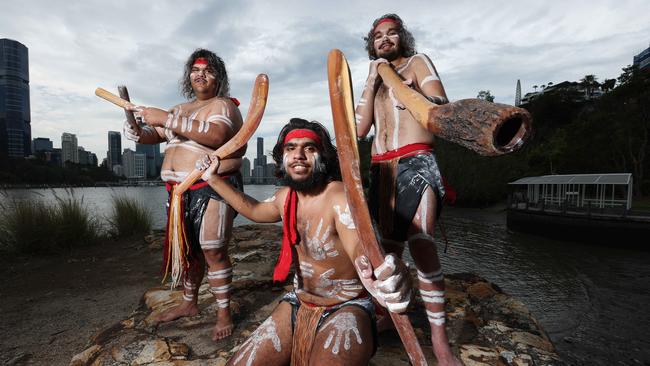
QLD News
Don't miss out on the headlines from QLD News. Followed categories will be added to My News.
A world-class First Nations Cultural Centre with permanent evening overwater drone shows could help Brisbane cement itself as a global leader in Indigenous tourism.
Brisbane 2032 Olympic and Paralympic Games Legacy Deputy Chair Cameron Costello said First Nations culture also needed to become more embedded in major events like the Brisbane Ekka, which could have a dedicated pavilion and special showbags.
The Quandamooka traditional owner and reconciliation advocate said Brisbane could be the first ever Games co-designed with First Nations people, from the design and construction of venues, to legacy tourism offerings.
“I think Sydney 2000 was a catalyst moment for us,” he said.
“In our Brisbane City master planning, if we integrate First Nations design within that, then Southeast Queensland is going to be transforming into this First Nations storytelling landscape where like Florence and Paris, you’re overwhelmed by the integration of culture within their architecture.
“That would be an amazing outcome that will outdo Sydney.”
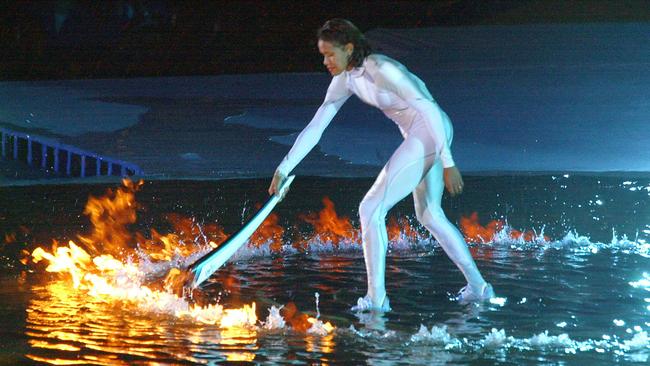
In the lead up to 2000, Sydney hosted a series of historic National Reconciliation efforts, including when 250,000 people marched across the Harbour Bridge in a show of support for and recognition of Indigenous Australians.
Cathy Freeman was also chosen as the face of Sydney 2000, with her lighting of the Olympic cauldron moment broadcast to 3.7 billion viewers around the world, and her 400m Gold Medal etched in Australian history.
Mr Costello said in the lead up to 2032, the focal point for reconciliation legacy should be opening a Queensland First Nations Cultural Centre in the vicinity of South Bank.
It would be a first of it kind Australian destination to celebrate the diversity of Aboriginal and Torres Strait Islander culture and heritage.
It’s understood the $3 million detailed business case for the project, funded through the City Deal and led by Arts Queensland, was completed in August.
“We want to be the welcome centre for Australia, because the two oldest living cultures – Aboriginal and Torres Strait Islander – are in our state,” he said.
“We own that, so we should celebrate that.”
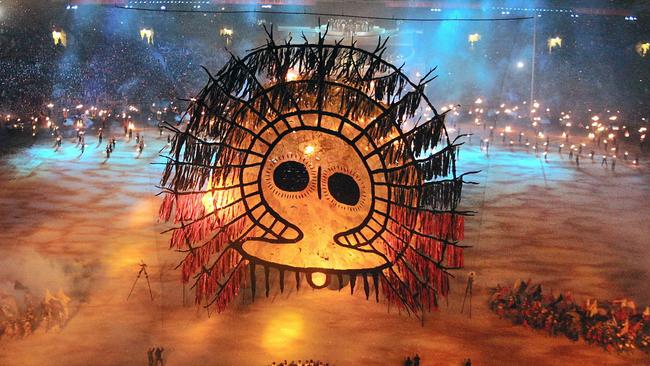
Inspired by their popularity at the Brisbane Festival, Mr Costello said a light and drone show could also be designed and made permanent at the centre, with the option to watch it from the bank or on boats on the Brisbane River.
He said such a fixed attraction could be akin to Las Vegas’ famous Bellagio Fountain, playing different designs and stories.
“I think there are massive opportunities for drone shows of First Nations storytelling happening every night,” he said.
“At South Bank, it’s a prime spot to do it and we’re going to put ourselves on the map if we have this show going all year round.”
Eddie Ruska, a proud descendant and elder of the Yuggera people, said there was a need for the cultural centre to teach locals and tourists about First Nations culture.
“I have been trying to push for traditional owners to have a building they can come to – we need it in the centre of Brisbane, so people know that the culture is there,” he said.
“I think the building needs artefacts and information to show people how we used to live before we were invaded.”
The founder of Nunukul Yuggera Aboriginal Dance Troupe said another way to highlight First Nations culture was to bring in more cultural festivals and experiences to the heart of Brisbane.
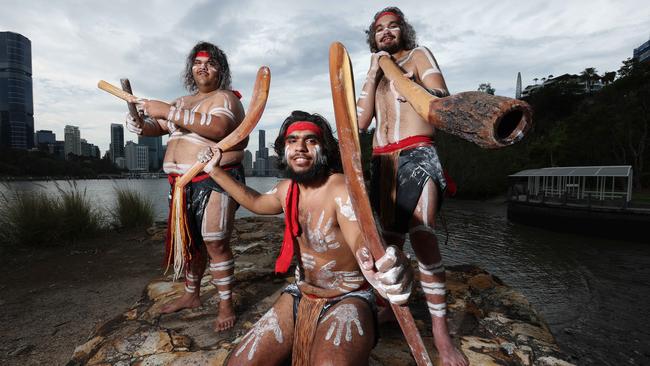
His grandson Aaron Ruska helps facilitate the Mirrabooka experience at Riverlife, one of the few city-based cultural offerings of its kind.
“We need more advertisements out there … and festivals but we need them in the city, not in the sticks so people know they are there,” he said.
“We need it early in the lead-up to the Olympics, so then people can start getting used to it.
“Because you’re going to get a lot of business in the next couple of years.
“You’re going to get more visitors coming over.”
Mr Costello said a more visible presence at major Queensland events like the Ekka would also help better showcase First Nations culture.
“I love the Ekka and I think it would be great to have a dedicated pavilion with exhibitions or it could be integrated into the show bags and with First Nations produce,” he said.
“I love how the region comes into the city and takes over, and so hearing some of those regional First Nations voices as well would be great in terms of what they do.”
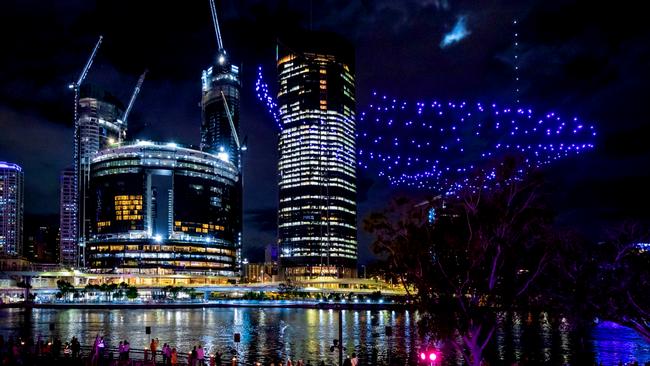
The University of Queensland Business School Professor in Tourism Lisa Ruhanen said the Brisbane Olympic and Paralympic Games presented a “once in a generation” opportunity to showcase our First Nations culture to the world.
“As millions of people around the world look to Brisbane … we can leverage the Games to increase awareness of First Nations peoples and cultures and in doing so, encourage visitation and participation in First Nations tourism in the lead up to, and well beyond the Games,” she said.
Prof Ruhanen said to increase global awareness of First Nations culture, UQ and the Queensland First Nations Tourism Council were helping businesses with promotion, accessibility and understanding the potential markets.
“Minjerribah Camping is an example of an Indigenous owned accommodation business looking to capitalise on increased visitation connected to the Games, particularly the Paralympic Games, by encouraging people to add a trip to Minjerribah (North Stradbroke Island) to their itinerary and developing accessibility initiatives such as beach wheelchairs,” she said.
Deputy Premier Jarrod Bleijie said the state government was focused on delivering a world-class Olympic and Paralympic Games for all of Queensland, from Brisbane to Bedourie and Tugun to the Torres Strait.
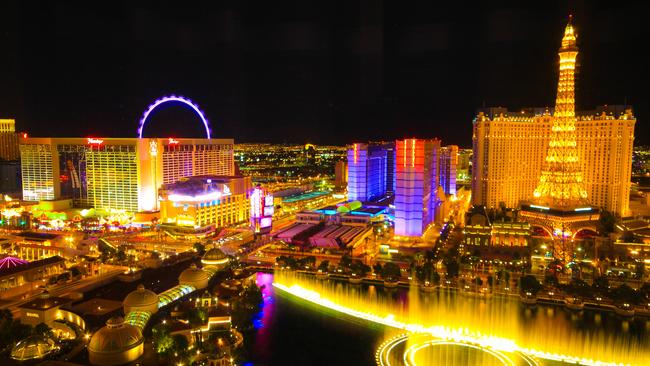
He said including legacy outcomes for our Aboriginal and Torres Strait Islander peoples was “an important part of that plan”.
He said an Independent Infrastructure Coordination Authority will be appointed to deliver a legacy plan for the Games which includes tourism, transport and infrastructure.
RNA Chief Executive Brendan Christou said First Nations involvement, storytelling and culture in the Ekka dated back to the year 2000 and had been embedded in the night show and entertainment arenas for more than a decade.
Mr Christou said organisers would warmly welcome the opportunity to discuss further ideas and proposals with Indigenous leaders in the lead up to the Games and beyond 2032.’
“We have worked with Indigenous elders, entertainers, artists and groups over many
years and look forward to continuing this important engagement,” he said.
“The Ekka forms a rich part of the state’s social and cultural heritage and its future,
and the RNA is committed to First Nations culture, education and reconciliation
continuing to be a very important part of this.”


